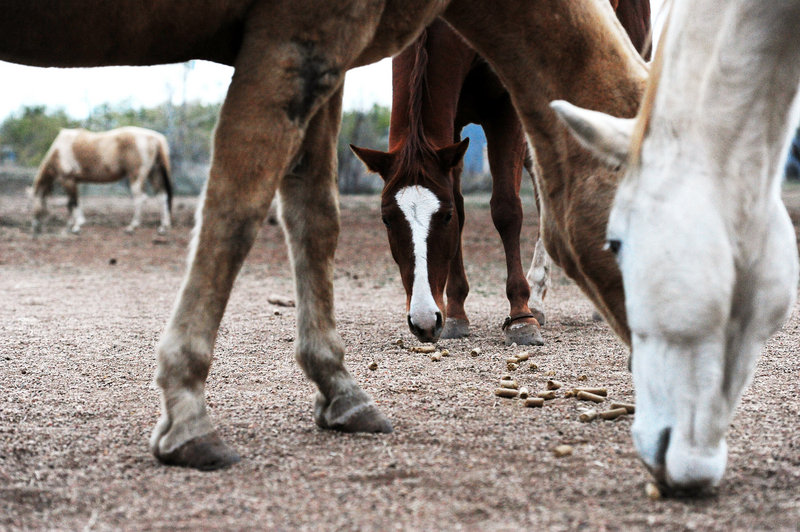A legislative committee will hear public testimony Tuesday on a bill to prohibit the slaughter of horses for human consumption.
L.D. 1286 would ban slaughterhouses for horses in Maine and any transportation of horses through Maine for slaughter in Canada.
It also would repeal current state law that allows horse meat to be sold in Maine as long as it is conspicuously labeled.
Supporters say the bill could prove controversial but Maine should take steps to outlaw horse slaughter.
Horse slaughterhouses were outlawed in the United States in 2007, after the Department of Agriculture said it did not have enough money or resources to inspect them. But last year, the government resumed inspections, allowing slaughterhouses to reopen.
The chief sponsors of Maine’s bill, Rep. Gary Knight, R-Livermore Falls, and Rep. Elizabeth Dickerson, D-Rockland, said they are concerned that someone might try to open a horse slaughterhouse in Maine.
“Our bill is a proactive measure,” said Dickerson, who owns a horse rescue farm. “It’s an inhumane process being used in the slaughterhouses. At least a cow will stand still, but a horse will not.”
Knight said he has heard that slaughterhouses shackle horses’ legs before slitting their throats.
The Legislature’s Agriculture, Conservation and Forestry Committee will hold a public hearing on L.D. 1286 at 1 p.m. Tuesday in Room 214 of the Cross State Office Building in Augusta. At a later date, the committee will hold a work session on the bill to decide on its recommendation to the Legislature.
A similar bill, introduced three years ago, never gained support and was withdrawn from consideration.
Knight said the new bill has support from both parties.
He said he decided to push the bill after hearing reports from Maine Friends of Animals that a farm in Vassalboro was sending horses to slaughterhouses in Canada. Knight said it is his understanding that the farm is no longer in business, but the legislation is still needed.
“Maine has become the focal point for horse (slaughter) trafficking,” he said. “I’ve talked to a lot of people and there is no one in my district who thinks this bill doesn’t make sense.”
Violators would be prohibited from owning animals and could be required to take humane-education courses.
Wendy Ireland, executive director of the Maine Harness Horsemen’s Association, said she is aware of the bill but is reserving judgment.
Ireland, whose organization promotes harness racing in Maine and represents more than 3,000 horse owners, trainers, breeders and drivers, said a big issue for all competitive horse owners is what to do when a horse nears the end of its racing life.
“Most owners try to find good homes for their horses, and most do,” she said.
L.D. 1286 was drafted with help from Falmouth-based Maine Friends of Animals, which estimates that 1,500 horses are shipped through Maine each year to slaughterhouses in Quebec, based on inspections done during border crossings.
Robert Fisk Jr., the organization’s president and director, said, “Our state serves as a funnel for horse slaughter.”
He said the market for horse meat is being driven by consumers in Europe — France and Belgium in particular — and Asia.
New Jersey Gov. Chris Christie signed a law in September that prohibits the slaughter of horses, transportation of horses to slaughter, and sales of horse meat for human consumption in his state.
At the time New Jersey adopted its law, the American Society for the Prevention of Cruelty to Animals said a national poll showed that 80 percent of Americans opposed horse slaughter for human consumption.
The Maine bill targets only horses, but the bill’s supporters say opponents fear that cows, chickens and pigs will be their next target to protect.
“It is a diversionary and false argument to classify this legislation as a conspiracy against all farm animals,” Fisk said in an opinion piece he submitted to the Portland Press Herald. “This is about one issue and one issue only: the slaughter of horses for human consumption, which 80 percent of the American public opposes.”
Dennis Hoey can be contacted at 791-6365 or at:
dhoey@pressherald.com
Copy the Story Link
Send questions/comments to the editors.




Success. Please wait for the page to reload. If the page does not reload within 5 seconds, please refresh the page.
Enter your email and password to access comments.
Hi, to comment on stories you must . This profile is in addition to your subscription and website login.
Already have a commenting profile? .
Invalid username/password.
Please check your email to confirm and complete your registration.
Only subscribers are eligible to post comments. Please subscribe or login first for digital access. Here’s why.
Use the form below to reset your password. When you've submitted your account email, we will send an email with a reset code.